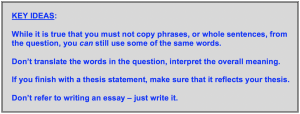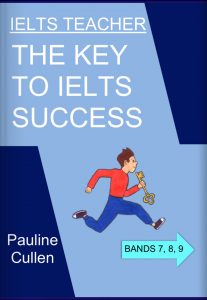
The introduction above was sent to me by a follower of mine asking for feedback. It was written in response to a writing task in my book The Key to IELTS Success. The question says:
‘Many people believe that playing video games is a waste of time and can even have a negative effect on the health of players.
To what extent do you agree or disagree?’
The sample introduction contains some common problems. Try to spot any yourself before we look at these in detail.
***************************************************
Problem 1) ‘Translating’ the words in the question
The most common problem I see in band 6 or 6.5 introductions is candidates trying too hard to avoid copying any words from the question. For many people, this means substituting the words in the question with a synonym. This often feels like a translation that is not quite right. If you have read my free book you will know that you do not have to avoid using all of the words. Sometimes a word in the question is used because it is the most appropriate or the most natural – replacing this with a synonym may mean you are using a word that is not appropriate or is not natural.
In the above example, we can see some instances of this:
Many = Numerous
People = individuals
A waste of time = a distraction
Health = well-being
The problem here is that these words are not exact synonyms and are not naturally used in this way. I often see the word ‘individual’ used like this when the word ‘people’ I much more natural.
This is what you should do instead:
- Rather than translating the words in the question, aim to interpret the meaning as precisely as you can.
- Before writing anything, think about what the question means and try to identify the key central idea.
- Without looking back at the question, explain the central issue at the heart of the question. Not looking back at the question means that you are more likely to use your own words and phrasing.
For example, the key issue in this question is that many people are concerned that playing video games not only wastes our time but can also have an impact on our health. Remember, your introduction must introduce the topic, so the following is a good way to start this essay:
Video games are a common form of entertainment nowadays. However, many people are concerned that playing them not only wastes our time but could also pose a risk to our health.
Notice that, although I used some of the same words, I often used them in a different way.
Look again at the sample. Can you find another common problem that is not related to vocabulary?
***************************************************
Problem 2) Finishing your introduction
In the final sentence, the writer has talked about what they are going to do in the essay. A lot of people try to write a sentence like this, and these are often referred to as a ‘scope sentence’. I talk about this in a lot more detail in Chapter 7 of The Key To IELTS Success. I will only briefly add here that a sentence that draws attention to what you are doing (‘here I am, about to throw more light on this issue’) can feel too personal and inappropriate for IELTS. This is how a journalist might write an article and does not reflect the tone needed for a formal discursive piece of writing. Many people prefer to finish their introduction with a thesis statement. Again, I have talked about this a great deal in chapter 7. In brief, the most important point to remember is that your ‘thesis statement’ can only be called that if it accurately reflects the thesis in your essay – the vast majority that I see do not.
To write a thesis statement:
- Be fully aware of your main thesis (your main argument that will be explained in your essay)
- Sum up your main thesis in one sentence
Plan before you write anything at all and always remember to focus on writing in a clear, natural way rather than simply focusing on producing a range of high-level vocabulary.
Here are some final key ideas to remember about writing an introduction:

Can you see any further problems in the sample introduction? Look at the comments and feedback below to see if you found them all.

Don’t forget to read my free book: The Key to IELTS Success for more help with IELTS writing.




Thanks pauline for the useful advice. I am confused about one thing that should we give any background statement in the introduction as most teachers discourage this , such as,the one you used, videos games are a common form of entertainment or should we start the introduction directly with thesis that some people believe……… Kindly help me with this.
I have no idea why anyone would give that advice – you would need to ask them yourself.
Hi Pauline
After reading most of your books I found it really useful to read the comments here on your blog as I am discovering problems other people have writing essays, which I also tend to struggle with. Reading about how you resolve these issues helps me understand what I failed to do on my last attempt and what I need to improve for my next. So thank you for answering the never-ending comments!
My old habits learned from various famous “teachers” online are slowly but surely wearing off, and I was very surprised to find out that you don`t really need a thesis statement, or if so you should better write it after you`ve finished your entire essay. However, I couldn`t find any information in your free book about background information, which I came to the conclusion that it should be carefully used, as it can fail its purpose as is the case with the thesis statement.
Can you emphasize a little bit more about what this extra information should do? I know it has to work with the other part of the introduction to introduce the topic to the reader, but why isn`t it enough to just paraphrase the question?
Hi Catalin, problems I often see (including in so -called ‘band 9′ essays’) begin with the very first sentence of the introduction. Many people describe this to me as a ‘general statement’, and often they got off-topic or misrepresent the topic given in the question. The problem is that they do introduce ‘extra’ information. That word ‘extra’ tells us that it is not necessary, and therefore not relevant. Your introduction should introduce the reader to your topic. So it must be relevant and directly related to the question. I am discussing these problems in more detail in my writing workbook (no, I do not know when it will be finished 🙂
Hi, Pauline! I am happy to let you know that following your advice helped me to improve my writing score from 6 to 7.5.
Wow, I am so pleased for you! Please let others know 🙂
Dear Miss Pauline,
Can you please evaluate my letter ?
WRITING TASK 01
A friend has written to you asking for advice about problem at work. You have had similar problem in the past.
Write a reply to your friend. In your letter
• Tell your friend you understand the problem
• Explained what happen to you in the past
• Suggest possible solution to the problem
Dear Sana,
How have you been? It has been so long since we last saw each other.
In the previous letter, you explained to me that you are experiencing difficulty regarding disposal of the medicine stock. I remember, you mentioned that it is near expiry stock and you cannot keep it for long in the company’s warehouse, as it is illegal.
Your problem is implicitly akin to mine that I faced few months ago. I also had medicine stock with only four months expiry. I explored for all the possible means of disposing it off and finally I sent that stock to the incineration area where it was burnt to ashes. I collected the pictorial evidence and attached it in a file.
I would suggest you to do the same; otherwise, you can send it back to the vendor company. Moreover, if stock quantity is small and you can arrange a suitable place than you can incinerate it on your own. Do not forget to keep the evidence.
I hope it would resolve your problem
Eram
Hi Eram, I will try to look at GT writing task 1 very soon and will try to look at your writing this week.
Dear Eram, I have completed feedback on your task 1 letter – if you contact me on Facebook I can show it to you.
Dear Pauline,
Can you send me the feedback which you did for Eram, as I am preparing for GT and it would be helpful for me.
Thank you
HI Pauline
I am stuck between native speakers.The topic i got in writing was
Some people believe that tv advertisements are useful while other believe that they are useless. Give your opinion.
Now three native IELTS teachers are giving me different answers. According to X, this is a discuss both side and your opinion essay.
According to Y , this is a to what extent essay .
According to Z , it could be both. And let me tell you that all of them are teaching IELTS for a long time. and I am really confused with this. Any sample essay in this domain would be highly appreciated mam. Despite paying huge amount of money towards training with native speakers, I got 6 band in writing. Really disappointed.
Your version of the question you were given is not accurate (there is no question that ends simply with ‘Give your opinion.’ I also think that something is missing from the initial statement. When people share writing questions after the test this is a common problem. The fact that you are looking for ways to answer different question ‘types’ is most likely the reason you are remaining stuck at band 6. I discuss the issue of question ‘types’ in chapter 7 of my free book – I really recommend you read all of it.
Here is a link https://keytoielts.com/product/ielts-teacher-the-key-to-ielts-success/
Dear Pauline,
I feel very fortunate that I am able to contact you and send you my queries regarding ielts writing.As where I live its virtually impossible to talk or discuss with an authentic Ielts teacher.I am extremely thankful to you for helping us,the students of ielts, and taking out time from your busy schedule.You are indeed a God’s blessing for us.
My question is related to the “Rest of introduction” after the restatement of the question in introduction.In your book O G to Ielts, on page 123 you have given four possible ways of how to proceed after restatement.One way you mentioned is:
Explain what you intend to write about,further you clarified this point with an example suggestion, that is : We need to consider both the benefits and the drawbacks of the internet
From your teachings,I have learned that I should make my opinion clear, however, I (personally) find this final sentence very vague not clear,feel like memorsied sort of statement.In other ways,feels like I am just expanding introduction by not stating my exact point ( whether opinion or any reaction),and still showing examiner I have written my opinion in a way: in truth feels like throwing dust in examiners eye.
Please Pauline dont take me wrong, I know you have written and it will be for sure correct but i want to understand final sentence purpose and your mentioned possible in book ( so I just elaborated my query)
Please accept my apologies if I said any thing wrong,as my English isnt that accurate:)
Sincerely,
Anam
Hello Anam, if you read chapter 7 of my free book then this should answer your question. In brief, there is a personal element to the way you choose to write your introduction. IN my book I explain about giving your opinion and whether it needs to be written in the introduction. The book is free and you can find a link here:https://keytoielts.com/product/ielts-teacher-the-key-to-ielts-success/
Dear Pauline,I hope you doing good.Thanks for your reply; as advised, I have again given a read to chapter 7 of your free book(up till page 88).But I have a query if you could explain would be very thankful.
On page 86 of free book you have mentioned that a thesis statement might take a role to control ideas in your writing.
I dont understand this statement how it controls; can you give an example of this line which you have written in the book.
Second Question in your free book on page 87 there are four types of thesis statements,submitted by a student, on which you commented.You mentioned along with 1,2 and 4 they are acceptable(depending on the context) but isn’t the 4th one “Less Definite”.Isnt it very vague.
Sincerely,
Anam
Hi Anam, what I mean by ‘control’ is that all of the ideas and argument expressed in your essay should all reflect your thesis statement. Most that I see do not. So, if a thesis statement that says ‘I completely disagree with this statement and believe that xyz is very harmful.’ This idea must control all of the ideas within the essay. But many examples I see then have an essay which argues that xyz is sometimes good and sometimes bad. In these cases, the ‘thesis statement’ is not a thesis – it is just a sentence that does not fit in this essay.
When you refer to ‘the 4th one’ did you mean ‘There are two major problems related to this; however, there are solutions to tackle them.’? The point I make in this part of the book is that we cannot judge a thesis statement without seeing the whole essay. In spite of this, time and again people send me single sentences and ask me to judge them as thesis statements. A thesis statement is only a sentence when it 1) is not within an essay and 2) when it does not accurately reflect the essay. Here, there must clearly be a previous sentence that explains what ‘related to this’ refers to. Apart from that, it is not vague as it very clearly states the view that there are 2 major problems and solutions to them – that is very specific.
Dear Pauline,
I cant thank you enough.It’s like a dream to me that I am able to get guidance of a highly qualified teacher.I searched a lot for correct guidance and finally have got the opportunity to have one of the mentors correct me .You are a blessing for all of the Ielts students.
Regarding my query for the sentence number 4:
There are two major problems related to this; however, there are solutions to tackle them
I am able to pick what you mean to say,though getting full grasp,of what you told, will require me to do deliberate practice.
However,I was pointing vague to the phrase “Two major problems” as my myopic view made me speculate that one should mention problems itself precisely ( because it made wonder what problems: Am I not suppose to mention in a word or two what problems exactly).But after reading your reply and again reading free book’s page number 87 I am able to understand it far much better.
I am very thankful to you for your kindness.
I’m glad you manages to grasp my meaning – I know it is a difficult concept to grasp, but it is a key one in essay writing. Once you can put it into practice, then I am sure you will see a positive impact on your writing score. As you say, the trick is to practise, practise, practise 🙂
Thanks a lot dear pauline, for being with us 🙂
Dear Pauline, hope you doing good.I read your free book today to seek guidance for task 1 of general writing.On page 70, I read a very beautifully structured paragraph under the heading Common problems(I thought to copy paste here to make it easy for me to pin point the paragraph,but I am incredulous if its against copy rights)
So,just quoting initial words which are “The vast majority of people”.
What attracted me in that is: you are staying with the topic,explaining your topic and mentioning your opinion-both implicitly and explicitly.
Can I keep this paragraph as a basic reference to understand how to write an argument and support it while mentioning one’s opinion at the same time.
Thank you always 🙂
Of course! I wrote the book to serve as a model for people as well as to give advice.
Thanks alot Pauline for being with us. Your books, your posts and your guidance are truly helping me clearing out my ambiguities and making me understand things better.
Anam
Hi Palline
I ve read a lot about making your position clear in the first paragraph(introduction) as well as the last (conclusion). I am reading your Succes To IELTS these days to update my ideas. However, in the example and sample provided in Official, I seldom see the writers point of view in the introduction. I m getting a bit confused. Would be happy to help! Thanks a lot. Mahmood from Iran
Hi Mahmood, if you read chapter 7 of the book I talk about whether you must give your opinion in the introduction or not. I also point out the problem with people believing that writing your opinion in the introduction means that you are making your position clear – this is not how that works. Read chapter 7 carefully to see why.
After reading your posts, I have noticed a change in my approach to writing. Instead of having any thumb rule of whether to put my opinion in the introduction or conclusion, I now leave much to the understanding of the task and how it needs to be responded. That sort of steers me on how should I write my essay. This means (and here is the uncertainty) that I am definitely going to respond better on the actual test day, but at the risk of thinking too much on how I should approach actual writing itself. Do you suggest to tackle writing with such spontaneity on the actual test day?
Thanks
People often write me messages in band 8 or 9 English, then in the test revert to their old band 6.5 habits. It isn’t a risk to relax and answer honestly and clearly, it’s the way to get the higher score you need. Practice and Send me a task 2 answer and I’ll let you know if you’re on the right track.
Thanks for the quick response. One more thing, I feel that in order to capture the gist of my arguments in essay into my thesis statement effectively, its much more easier to leave this second sentence of my introduction for the end. And in the Computer delivered test, it is easier to write it in the end to a much better effect than writing it at the beginning. Because somewhere along the way, I may be in a rush to write the introduction initially. But when I have the full piece written in front, it is easier.
That’s certainly how I prefer to write my own introductions. You’ll also find that your overall position is clearer in your mind if you write that way.
Thank you, Pauline. ❤️
Hello Pauline,
In Cambridge 14, Test 2 sample answer begins the introduction with:
Some of the people believe that friends with exactly the same opinions on different topics are better than the ones that can argue with them.
Personally, I prefer to write introductions by introducing the topic (like your video game example) by making a general statement then presenting a statement like above later. When I practiced writing on this, I began with:
“Friendship is an integral part of individuals’ life.”
Secondly, in the same answer, the last paragraph begins with:
In conclusion, “I would like to say” –
Don’t you think this is a bit informal and less appropriate language for task 2.
Regards.
I don;t have that book so I can’t comment on the overall tone. I prefer to see my opening sentence as introducing the context – so it is less general than you may think. As I’ve said before, models in books like this are not helpful in teaching – I am trying to fix that in my new book (it isn’t finished yet!)